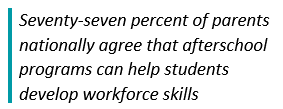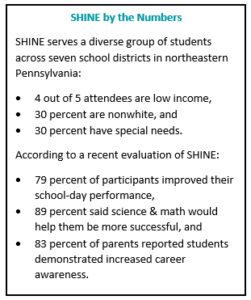As a middle school student, Jesse Eberly first discovered his interest in computer science at an afterschool and summer learning program in Jim Thorpe, Pennsylvania called Schools and Homes in Education (SHINE). Now a senior at the Carbon Career & Technical Institute (CCTI), Jesse remembers building a shed the summer he joined SHINE as his first hands-on learning experience. The next year, he began taking afterschool computer classes in drafting and design on the CCTI campus, and the rest was history.
His experiences in afterschool led him to attend CCTI and specialize in Information Technology, computer engineering and networking, while still connecting with SHINE as a volunteer. Now a recent graduate of CCTI, he wants to build upon the credits he has already earned to complete a degree in cybersecurity and eventually work at the Pentagon. Jesse knows it is time to do away with the old stigma around tech schools. “If the career you want to have is offered there” he said, “it’s great.” And through his early experiences in SHINE’s afterschool and summer programs, Jesse knew what career he wanted to have.
Early Career Exposure Through SHINE
 Afterschool programs like SHINE give elementary and middle school students the opportunity to explore and prepare for different careers by delivering developmentally appropriate curriculum. They are effective in building student’s academic and technical skills as well as social and emotional development, including employability skills like teamwork, communication and critical thinking. In fact, 77 percent of parents nationally agree that afterschool programs can help students develop workforce skills. These programs can reinforce and strengthen learning in the classroom and should be critical partners for Career Technical Education (CTE) programs or other career-focused learning.
Afterschool programs like SHINE give elementary and middle school students the opportunity to explore and prepare for different careers by delivering developmentally appropriate curriculum. They are effective in building student’s academic and technical skills as well as social and emotional development, including employability skills like teamwork, communication and critical thinking. In fact, 77 percent of parents nationally agree that afterschool programs can help students develop workforce skills. These programs can reinforce and strengthen learning in the classroom and should be critical partners for Career Technical Education (CTE) programs or other career-focused learning.
Activities in the SHINE program, for example, are focused around high-priority occupations in health care, engineering, and green energy, giving students a chance to see how they can apply their education to in-demand careers. The program began as part of a community-wide plan to create seamless educational services from the elementary through high school system, including the area’s career and technical center and on to college.
Afterschool programs can also expose middle school students to different career opportunities they might not have considered otherwise. Skyler, another recent graduate of CCTI, has volunteered and worked in the SHINE program through all four years of high school. She helped establish two-week summer camps with a focus on exposing middle schoolers to non-traditional careers. The camps provide opportunities for girls in carpentry, auto collision repair and engineering, and for boys in culinary arts, cosmetology and nursing. Last year at CCTI, Skyler ran into one of her former campers, a young man entering his freshman year, who had just signed up for a rotation in nursing. ‘If you hadn’t come to the camp would you have tried nursing?” She recalls asking. “Absolutely not”, he responded.
State Strategies to Expand Career Exploration Opportunities in Afterschool Programs
All elementary and middle school students should be able to access programs like SHINE, and state leaders play a critical role in supporting and expanding these opportunities. Many afterschool programs like SHINE are funded through the Every Student Succeeds Act (ESSA)’s 21st Century Community Learning Center grant program, which gives states the flexibility to set priorities and determine how funds will be used at the local level. With ESSA’s focus on well-rounded education, several states have opted to promote career exploration and Science, Technology, Engineering and Mathematics (STEM) education in afterschool programs.
In Pennsylvania, where SHINE is based, the state set the following priorities for ESSA-funded afterschool programs in its state plan: STEM education; workforce, career and college readiness; and planning for transitional, vocational/technical services. Pennsylvania is also elevating career exploration up as a statewide priority by holding schools and districts accountable for career exploration through school and district report cards, encouraging students to complete an individualized career plan by eighth grade.
Opportunities for Alignment with Perkins V
The Strengthening Career and Technical Education for the 21st Century Act (Perkins V), which was reauthorized last year, also give states the opportunity to connect CTE and afterschool programs. One significant change under Perkins V is that states can now invest Perkins funds in middle school CTE programs, allowing them to begin career exploration activities in even earlier grades. To maximize the effectiveness of these activities, state leaders should consider how to bridge afterschool career exploration with school-based content and curriculum to reinforce what students are learning in the classroom.
State leaders can also take steps to foster collaboration between afterschool and CTE programs through Perkins V by engaging state afterschool leaders, aligning curriculum and resources, and encouraging local Perkins recipients to engage afterschool programs as they develop their local applications. In the national effort to expand career exploration and prepare learners for career success, afterschool programs can play a critical role.
This blog post is the first in a series on the intersection of CTE and afterschool programs, exploring strategies and opportunities to bridge learning both in and out of the classroom. It was written by Jillian Luchner from the Afterschool Alliance, Christopher Neitzey from the Afterschool Alliance and Austin Estes from Advance CTE.

